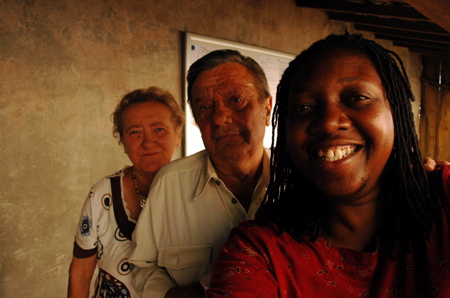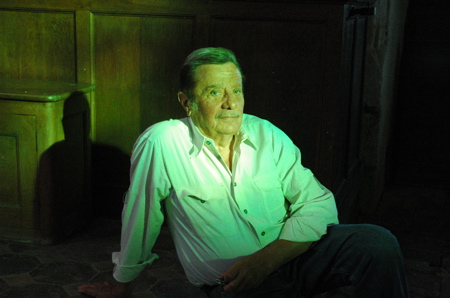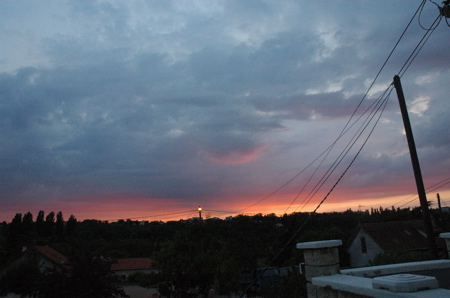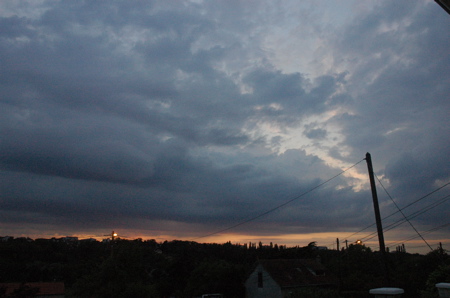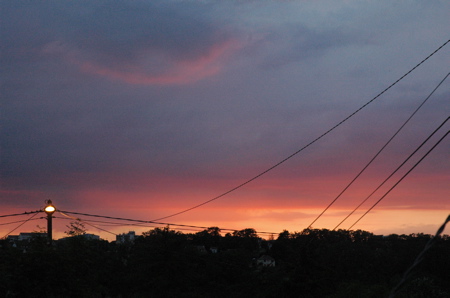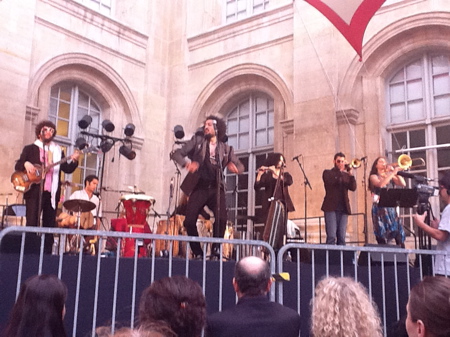Kuteki-teki;
Kuena umanya muamba tshidimu;
Maweja m-muena kukosolola. (Tshiluba)
Ne soyez pas un entasseur de biens;
Vous ne savez pas ce qui se passera pendant l’année;
C’est D’ieu qui mesure le temps de votre vie. (French)
Don’t accumulate material possessions;
You do not know what will happen during the year;
It is G-d who mesures the length of your life. (English)
The Meaning:
Tomorrow is a day G-d only knows about. You could accumulate things as much as you want and still die unexpectedly. Papa Tshimanga gives the example of a man who planned and accumulated possessions for years to come. He died in his sleep one night and never got to use his wealth.
The exodus began on June 24th when public schools in France closed for the summer vacations. Immediately, parents packed their children and boats to head out for the sea or to Spain.
“Would you like to sign up for the children movie and picnic?” The librarian asks a parent.
“No, we won’t be there.” she replies.
As I browse through books at the local public library, I hear the same scenario over and over again with the librarian asking and the parents announcing they’re going out of town.
Maybe it’s just French parents who are leaving Paris.
I take the train to Paris today. It’s a sunny day. I want to hang out by La Seine. There are a few artistic péniches there; maybe I will find some artists and interview them.
In front of la Péniche Anako, the poster of events shows a busy month of daily concerts. Anako is a floating cultural center, complete with an auditorium. I ask the barman about meeting some artists.
“They’re all leaving,” he said. “We’re leaving too.”
Their last concert is on Sunday and they’re leaving Tuesday.
“Try la Péniche Antipode, two boats down,” he adds. “Maybe they’ll be staying for the summer.”
At the designated barge, musicians are busy loading up la Péniche Antipode with musical instruments and sound system to gear up for tonight’s pop concert. Music is already blasting through the speakers. On the deck, I hold on to the railing as the barge waves because a tourist shuttle boat speeds by.
I approach the young man smoking near the bar; he has short blond hair, except for one dread lock dangling on the back of his head. He explains that they will be travelling on their boat, staying one month in a banlieue of Paris up north, then the next month, at another town. So no, they won’t be in Paris this summer.
I leave thinking that next time I want to do a story series on Paris, I will have to do it during the year when all Parisians are in town.
They say in the Summer, Paris is left to tourists.
30
Jun
I recently experienced the weirdest thing: Herd Mentality.
It was at a concert in Paris. At first, people were standing in the courtaud; some were sitting along the walls. But as the band was late to start, a woman standing at the very front, decided to sit down on the floor. Since she was at the front, people took it as a cue and sat down too. As more spectators streamed in and saw the front-row people on the floor, they also sat down.
Sitting down became the status quo and I was suddenly the only one standing up front. By the time the concert began, I became the anomaly and was asked to sit down as you can see in the video.
Maybe it’s a cultural thing in France, the étiquette: to sit down during a concert might be a way to show respect for the band. Who knows? But how can you sit down while listening to the Yemen Blues’s absolutely amazing, electrifying music?
You must dance to that!
It took several trials for the band leader to raise the crowd up on its feet.
“What you saw here at the concert is quite a métaphore for France,” said the young woman who had been sitting next to me. “It is glacé at first, but then people get more relaxed.”
Charlie, not her real name, introduced herself as being Italian, although she was actually born in Paris, of an Italian father.
Maybe by saying she is Italian, Charlie is trying to say “I am not closed in; I am willing to meet you and get to know you beyond the ‘bonjour monsieur/madame’.”
“In Italy, it’s not like this,” she added. “Paris has lost its people character and has become more mainstream, more uniform.”
As Paris’s cost of living increases and artists are no longer able to live comfortably in the city, so are affected the social ties of the city of lights. Young professionals like Charlie can no longer afford to spend 60 EUROs to hang out at a bar.
“So we never go out anymore,” Charlie said. She and her friends go to a store, buy their drinks and then hang out at a friend’s appartment.
Charlie, who is a beautiful brunette, 34 years old and single says there is very little chance for her to meet Mr. Right in such an environment.
Despite the social imperfections, I still find Paris charming. The one thing I have a hard time with is the herd mentality.
I am too American for that.
I spent a day with ‘The Cyprian Josson Gospel Singers.’
I followed them as they travelled from Chartres to a beautiful old church in Orrouer, France.
The church was set in the middle of fields of corn and wheat; and French villagers drove in to come to the concert.
The Cyprian Josson Gospel Singers performed during the 10th anniversary of the Gospel & Negro Spiritual Festival of Chartres.
28
Jun
I have been getting a steady stream of reactions from the French people when they learn that I am American.
During Passover in April, I got invited to a seder. The three young people criticized Americans for refusing to import a particular famous French cheese (I don’t remember which one). They were hurt. I could see the refusal bruised their national pride. But personally, I wouldn’t touch a cheese that is moldy and green with possibly worms wiggling out of it.
In Chartres, France, a couple stopped and wondered why I was photographing their neighbor’s house.
“We don’t have windows like this in Chicago,” I explained; their medievial city fascinates me.
“Yes, but you have Strauss-Kahn,” the man replied.
The man was not mean or anything; he simply spoke the first image that came up to his mind when I mentioned the United States.
So when I decided to follow my friend Cyprian and his band, The Cyprian Josson Gospel Singers, to the heart of rural France for their concert, I was a bit apprehensive.
Even before the concert started, a man stopped me in front of the church.
“Are you the lady from Chicago?” he asked in English.
“Yes,” I replied hesitantly.
“I love America,” said the man passionately.
Meet Bernard aka “Bernie.” The 75-year-old American aficionado used to work as a barber in an American base in France in the 60s. He says, “Americans are cool.”
Bernie loves the American mentality. On the base, higher officers said hello to him on the streets, while French officers would not have acknowledged that he existed.
When the American troops left France in 1966, Bernie was devastated. He would have followed them, but he had a wife and two small children. To this day Bernie says, this was the best period of his life.
“America is his life,” chipped in his wife, Andrée, who joined us.
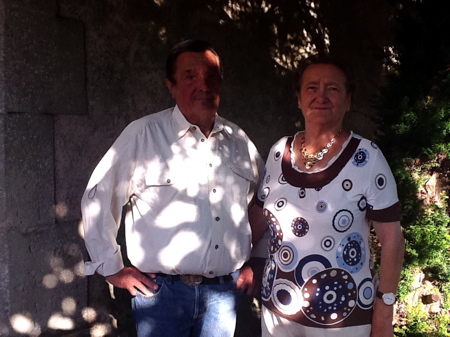
Thirty years after his American-base experience, Bernie and his wife flew to the United States and visited Washington, D.C. and New York City. They are eager to go back.
“I don’t speak English,” Bernie said. “I speak American.”
27
Jun
Mbwa wa lubilu ushiile nyama panshi. (Tshiluba)
Un chien trop rapide dépasse sa proie. (French)
A dog running too fast leaves its prey on the ground. (English)
The proverb advises not to do things too quickly. Slow down! Or you might lose the very thing that really matters.
This can apply to the student who wants to learn too fast, does not understand the subject and ends up not passing his exams. It can apply to the overzealous man who sees all his projects fail.
24
Jun
Thursday sunsets are the perfect cure for any day’ s blues. Not feeling well, I try not to glance at my to-do list, I have barely touched it all day.
At dusk, I surrender: my body needs to rest.
On the balcony, my legs leisurely dangling on the ledge, I sit back and enjoy the view. I am gifted with a sunset.
I suddenly understand Claude Monet’s persistence in painting the very same haystack throughout the seasons. The spring lights simply transformed the hay from the winter. I feel the same way about my sunsets.
Sunsets, I realize, are never the same twice. As I photograph it, I keep discovering new shapes and colors on the celestial canvas.
There are so many varieties within this Thursday sunset, let alone previous sunsets and future ones.
Infinite bliss and beauty.
I relax and enjoy the last hues of colors, feeling blessed to witness it all.
22
Jun
Watch VIDEO of the Music Festival in Paris
Last night, a friend invited me to a concert at the Museum of Jewish Art. She ended up not showing up. And I got to discover Paris.
The band, Yemen Blues, was electrifying. Based in Tel Aviv and New York, the group perform Blues, Folk and Funk, singing in different languages, including Hebrew and Arabic. The song that simply blew me away was in Créole (you can hear a portion of it in the video above).
At the concert, I met a young French woman of Italian origin. After Yemen Blues, she showed me other musical scenes in the city. I found out this was a special night. It was La fête de la musique in Paris, one of the most popular musical events that has occured every year on June 21st for the last 2 decades. The event has become so popular that it is now happening all over cities in Europe.
As we walked on the streets, cafés were packed. There were bands playing everywhere! On George Pompidou plaza, we saw a group of Taiko drummers, competing for attention right next to a marching band. On the other side of the plaza, an Afro-Caribbean group was curled up in a tight circle, singing a cappella.
Even in alleys, there was music. I passed by an Asian band that was finishing up its performance by the side of la Cathédrale Notre Dame de Paris. The band had ardent fans who jumped and waved as I filmed. Further up next to the sculpture pond, a rock band was blasting away.
This street music festival was set to go on until 5 a.m. Never mind that the next day was a workday in Paris! By 11 pm, my new friend bid me goodbye to catch some sleep and I continued wandering through the city. A poem I once read on the métro came to my mind:
“I have often dreamt of writing a book on Paris that is like an aimless long walk where you find nothing of what you’re looking for, but lots of things you were not even aware of.” _ Julien Green
That poem embodied the night of musical Paris.
In the streets, I mingled with a joyous crowd of people of all ages. Several young men were holding bottles of beer as they walked and chatted with friends.
Some people were even shopping while listening to music. Stores were still open, quite an exception to their usual 6 p.m.-closing time. At the door of a store, a young man greeted me by reciting a Fable of LaFontaine.
“Oh! You are the most beautiful of the guests in these woods.”
I laughed and headed home. Time to sleep. It was close to 1 a.m.
21
Jun
In France, I discovered that the process of naming a child can be a cultural adventure.
Claudine Brillant and her husband live in a small village outside of Chartres. They decided to find a name for their child by pulling out a calendar. French calendars list names of Catholic saints and their commemorative dates.
Starting with the month of January, Claudine ran her finger down the days, looking for a name. She got to Sainte Sandrine; she looked at her husband, who shook his head. With a name like Sandrine, kids at school might tease her and call her Sardine. They finally settled on the name Sophie from Sainte Sophie found on May 25.
In Tours, central France, a young couple went cruising through old cemeteries to look for not-so-common names for their unborn child. They had a baby a few weeks ago and named her, Adelaïde.
In my family we don’t bother being creative with our name search; we honor an ancestor by naming the child after him. It keeps things simple.
“There is a mistake here. My Mom is not that old!” exclaimed my nephew, who is browsing through our family tree on my iPad.
I looked over his shoulder and checked to see.
“That’s not your Mom; it’s your great-aunt,” I replied.
The two women have the same name, Mulanga, but were born 20 years apart. Mind you, these are first names. Family names do not exist traditionally in Luba culture.
In my family, name repetition is rampant. My grandmother Mbuyi already has 7 descendants named after her; I have so many cousins named Mbuyi, including my oldest sister.
But you don’t have to follow the Luba tradition to find a name for a child. If you open old literature books, you might find interesting names like the Gaulish name, Wouivre, which means snake or a river that snakes through the landscape.
I am having lunch with my friends, Cyprian and Martine at their home in Chartres, France. It is a simple fare of tabouleh salad, pasta with homemade mayonnaise and delicious bits of salmon mixed in.
On television, there is a documentary on Armenian Christians of France. At the table, we are talking about social integration in the country. It all started when I asked if immigrants were welcomed in French society.
Martine replies yes, but they are expected to become fully French as they live in France.
“We are very proud of our history and expect people to know it,” says Martine, explaining that it is the base of French patriotism.
The fact that Russian nobility in the 17th century spoke French is still a source of pride for French citizens today. They are proud of their culture, of their language and want to conserve it.
French was the lingua franca for 3 centuries, only recently overshadowed by English. In an effort to preserve their language, French conservators are requiring, for instance, that American movies showing in Paris theaters be dubbed instead of subtitled.
I remark how different that attitude is from the United States. When I became an American citizen, the juge at the beautiful courtroom ceremony said words that warmed my heart:
“Although you have sworn loyalty to the United States government, you should keep your culture, your language, because with your heritage, you enrich America.”
By contrast, French of the right wing say: throw out your culture in order to become French.
Martine explains French conservators fear losing their Frenchness. They want to hold on to the French culture by all means. That includes creating courses to bring immigrants up to speed with French history and behavior. Indeed, after a couple of generations, the immigrant family looks very much French.
What conservators do not realize is that you do not lose your culture by living next door to someone who has a different one.
“I cannot expect Cyprian to have the same childhood memories as I do,” Martine says. “That’s impossible and ridiculous.”
At one point she opens a tupperware. The smell almost knocks me out. Martine cuts into the Camembert and offers us a piece. Cyprian and I both vigorously shake our heads no. I like cheese, but not that kind. As for Cyprian, he does not eat cheese. Period. I am sure Martine would faint over some of our strong smelling African dishes.
“I am married to him and we have children together,” Martine continues. “And I still consider myself very much French.”
Martine was born and raised in Chartres. Cyprian is originally from Nigeria and as he says himself he has firmly planted ‘his bottle’ (ie. his life) in Chartres, France.
They are not unique as far as mixed couples.
I remember the first week I was in France. I was standing in the main aisle of a supermarket, watching people as they shopped. I saw so many mixed couple pass by; I was amazed.
Despite its conservatism, France has the highest number of mixed couples in Europe.






